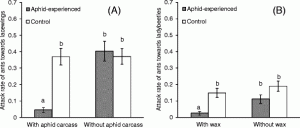Ants rely on chemical information to make sense of their environment. This includes everything from recognizing other ants to communicating about food sources. Ants are highly social creatures, and are very successful at using and shaping their environment. This particular research looked at a special interaction that takes place in certain ant colonies. Certain species of ants have developed a mutually beneficial relationship with aphids. This mutualism is good for both species. The aphids provide the ants with honeydew, which they use as a supplemental food source. In return, the ants provide protection against predators that might eat aphids. However, these predators in turn have developed strategies for fooling the ants to get at aphids. They exploit the ant’s sensory systems and mimic the chemical signals that aphids give off. This study examined how the success of this mimicry is affected by what experience the ants have with aphids, and how ants exhibit learning behavior in processing signals.

Tetramorium tsushime, the ant species tested in this study (http://ant.edb.miyakyo-u.ac.jp/E/Taxo/F40902.html)
http://ant.edb.miyakyo-u.ac.jp/E/Taxo/F40902.html
To test what effect the ants previous experience with aphids had on their reactions to predators, the researchers raised the ants in two groups, then put them in an enclosure that had either aphids in it or no aphids, and left them for several hours. Then, they took the ants and put them in an area with no aphids, again leaving them there for several hours. This was to get the ants accustomed to aphids (or not), but remove any effects that being in the immediate presence of aphids might have. The researchers then introduced one of the two aphid predators, with or without it’s mimicry display.
The results showed that ants that had previously encountered aphids attacked predators with the mimic signal far less often than ants that had no experience. Inexperienced ants attacked predators irrespective of mimic signal or not. These results seem to show that in order to be fooled by a predator’s mimic signal, the ants first have to have encountered aphids and learned that they should protect them and not attack. If the behavior was innate, even inexperienced ants would not attack predator mimics, knowing intuitively that they represented a beneficial signal.

A graph of the researchers results. Graph A shows the results when confronted with Lacewings. Graph B shows the results when confronted with ladybeetles. The y axis shows the rate of times the ant attacked a predator per times that they encountered the predator. Each predator type was tested on both groups of ants with mimicry or without.
This research is important because it demonstrates that ants learn from experience which signals to attack and which to not attack. We don’t often think of ants as learning, but they do seem to show some ability to alter their behavior according to experience. An interesting follow up study might be to take inexperienced ants that had encountered predators, expose them to aphids, and see if their behavior was at all changed. This study also supports the idea that mimicry only works if the frequency of mimics to real signals is just so, otherwise it breaks down. This study also has implications given that aphids are often considered a pest of crops and garden plants. The behavior of ants around aphids and their predators could help us understand their ecology and ways to manage them more effectively.
Article:
Hayashi, Masayuki., Nomura, Masashi., Nakamuta, Kiyoshi., “Efficacy of chemical mimicry by aphid predators depends on aphid learning by ants”. Journal of Chemical Ecology, 2016. 42 236-239
